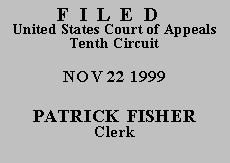

| RODNEY ALAN GUNDERSON,
vs.
BILL HETTGAR, Deputy Warden;
ATTORNEY GENERAL OF THE
STATE OF WYOMING |
|
Mr. Gunderson was convicted of three counts of aggravated assault and battery and was sentenced to life imprisonment as an habitual criminal. His conviction was affirmed on direct appeal. See Gunderson v. Wyoming, 925 P.2d 1300 (Wyo. Oct. 11, 1996). Mr. Gunderson does not indicate that a petition for certiorari was filed in the Supreme Court; thus, his conviction became final when the time for seeking certiorari review expired. See 28 U.S.C. § 2254(d)(1); Rhine v. Boone, 182 F.3d 1153, 1155 (10th Cir. 1999). Mr. Gunderson did not seek post-conviction review in the Wyoming courts.
Mr. Gunderson filed his federal habeas petition on October 31, 1997, alleging (1) prosecutorial misconduct based upon Brady violations; (2) ineffective assistance of counsel including a jurisdictional argument that the crime was committed on an Indian reservation; and (3) denial of due process and cruel and unusual punishment based upon application of new law and the denial of his petition for rehearing by the Wyoming Supreme Court. At a minimum, Mr. Gunderson now concedes that his prosecutorial misconduct claim was unexhausted, see Aplt. Br. at 3I, and we agree with the district court that the ineffective assistance of counsel claim was not exhausted either. Mr. Gunderson argues that his ineffective assistance claim was exhausted in his state direct appeal when he unsuccessfully sought leave to file a supplemental brief six days before oral argument. Such an attempt does not constitute a "serious and meaningful" opportunity for both parties, including the State to exhaust federal claims. See Keeney v. Tamayo-Reyes, 504 U.S. 1, 9-10 (1991); Satterwhite v. Lynaugh, 886 F.2d 90, 92-93 (5th Cir. 1989). The district court's reliance upon unpublished orders and judgments for these and other well-established exhaustion principles did not prejudice Mr. Gunderson.
The district court's decision to dismiss the habeas petition, rather than abate the proceedings, so as to possibly prevent the running of the one-year limitation period contained in 28 U.S.C. § 2244(d)(1)(A), is reviewed for an abuse of discretion. See Brewer v. Johnson, 139 F.3d 491, 493 (5th Cir. 1998). We find no abuse of discretion. Exhaustion is an obvious statutory prerequisite, see 28 U.S.C. § 2254(c). Wyoming has an available procedure for post-conviction relief, see Wyo. Stat. Ann. §§ 7-14-101(b); 7-14-103(b) (Lexis 1999), and waiving the exhaustion requirement, as suggested by Mr. Gunderson, would not be appropriate. The need to file a state post-conviction proceeding to toll the statute, see 28 U.S.C. 2254(d)(2), would seem apparent given the vast difference in grounds raised upon direct appeal and in the federal petition.
We DENY the Application for a Certificate of Appealability and DISMISS the appeal.
Entered for the Court
Paul J. Kelly, Jr.
Circuit Judge
*. This order and judgment is not binding precedent, except under the doctrines of law of the case, res judicata, and collateral estoppel. This court generally disfavors the citation of orders and judgments; nevertheless, an order and judgment may be cited under the terms and conditions of 10th Cir. R. 36.3.
**. After examining the briefs and the appellate record, this three-judge panel has determined unanimously that oral argument would not be of material assistance in the determination of this appeal. See Fed. R. App. P. 34(a); 10th Cir. R. 34.1 (G). The cause is therefore ordered submitted without oral argument.